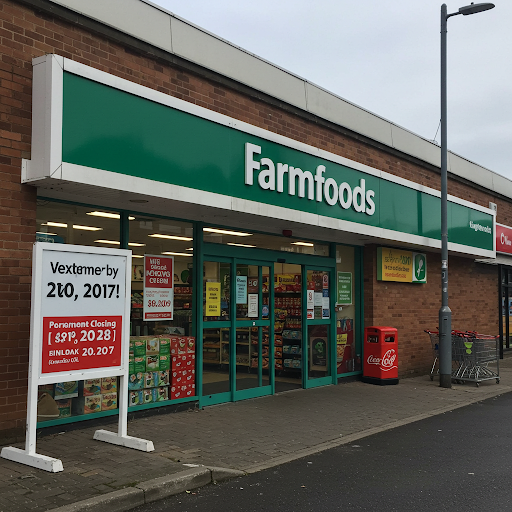In a development that has sparked surprise and concern within the local community, the Farmfoods branch in Knightswood has officially closed its doors permanently. Known for offering affordable frozen and grocery items, the store had served as a dependable staple for families and individuals in the area for many years. The closure has led to questions about retail trends, community needs, and the economic realities facing local businesses.
A Trusted Community Store
Farmfoods has long held a reputation in the UK for providing quality frozen foods, groceries, and household essentials at low prices. For residents of Knightswood—a residential area in Glasgow—this branch was more than just a place to shop. It was part of daily routines, a neighborhood fixture where staff knew customers by name, and a lifeline for those trying to stretch tight budgets. Its closure marks the end of an era for many locals who had come to rely on it.
Quiet Announcement, Loud Impact
The closure of the Farmfoods Knightswood store came with minimal public announcement. Unlike some larger corporate shutdowns that are broadcast in the media or accompanied by high-profile signage, this store’s shutdown was relatively quiet. Many customers arrived only to find locked doors and notices informing them of the permanent closure. For a store so integral to the community, the lack of advance warning left residents feeling caught off guard.
“I went there last week to pick up my usual groceries, and I couldn’t believe it was shut down,” said Margaret, a 68-year-old Knightswood resident. “It’s not just a store to me. It was part of my weekly routine.”
Why Did It Close?
While Farmfoods has not released an official statement detailing the specific reasons for this branch’s closure, several factors may have played a role. Industry analysts point to a range of challenges:
-
Rising Operational Costs: Energy bills, staffing costs, and rent increases have hit small and medium-sized branches hard.
-
Shifting Consumer Habits: More shoppers are turning to online grocery platforms or larger supermarkets offering a broader range of services.
-
Economic Pressure on Low-Income Areas: As inflation affects consumer spending, even value-based stores like Farmfoods are feeling the strain.
Though the Knightswood location had a loyal customer base, it’s possible that the overall profitability did not meet corporate thresholds for sustainability.
Community Reactions
The response from the community has been overwhelmingly one of disappointment and concern. Many residents, particularly the elderly and those without transport, are now facing increased difficulty accessing affordable groceries. The next nearest Farmfoods branches are several miles away—too far for those who rely on public transportation or walk to shop.
“I don’t drive, and now I have to take two buses just to reach another branch,” said John, a disabled pensioner. “It’s not just inconvenient—it’s a real challenge.”
Local social media pages lit up with comments from frustrated residents expressing sorrow over the closure and speculating on what might replace the now-empty retail space. Some community members have called for local government intervention to ensure that essential services remain accessible in the area.
The Bigger Picture: Retail in Transition
The closure of the Knightswood Farmfoods store is not an isolated incident. Across the UK, retail stores—particularly in smaller neighborhoods—are shutting down at increasing rates. Brick-and-mortar locations face tough competition from online giants like Amazon and Ocado, as well as from budget supermarket chains that have rapidly expanded their reach, such as Aldi and Lidl.
Moreover, the aftermath of the COVID-19 pandemic has accelerated changes in shopping behavior. Many people, once regular in-store shoppers, have shifted permanently to online orders and home deliveries. These changes leave traditional stores, especially those in less affluent areas, in a precarious position.
What Happens Next?
As of now, the future of the vacant Knightswood property remains uncertain. Some local residents have expressed hope that another affordable grocery chain or community market could take over the space. Others fear that the unit may remain empty for an extended period, contributing to the gradual decline of the local shopping area.
Glasgow City Council has yet to make any statements regarding redevelopment plans or possible incentives for businesses to occupy the space. However, some community organizations have begun exploring options to petition for a new essential services provider to be established in the area.
Supporting Local Retailers
This closure also raises broader questions about how communities can support local retailers and how councils can work to preserve neighborhood access to affordable shopping. Some potential solutions include:
-
Subsidizing Local Businesses: Offering financial support to key service providers in underserved areas.
-
Encouraging Pop-Up Markets: Temporarily filling retail gaps with community-run grocery stalls or mobile food vendors.
-
Improved Transportation Links: Ensuring residents without cars can still access essential goods through better public transport routes.
Without active intervention, other neighborhoods across the country may soon find themselves in similar situations, facing store closures with few alternatives.
A Call for Action
The Knightswood Farmfoods closure is more than a single business decision—it’s a signal of the wider challenges facing retail and community infrastructure in the UK today. While economic realities must be acknowledged, so too must the social consequences of removing essential services from neighborhoods that depend on them.
For many Knightswood residents, this isn’t just about losing a store. It’s about the loss of independence, affordability, and the sense of connection that comes from routine and community-centered shopping. Policymakers, business leaders, and local communities alike must come together to find solutions that prioritize people as much as profit.
Final Thoughts
The permanent closure of the Farmfoods branch in Knightswood has left a noticeable gap in the community. As residents adjust to the loss, the broader implications of such closures demand attention from all levels of society. Whether through community action, policy change, or innovation in retail strategy, the hope remains that Knightswood—and similar areas—won’t be left behind in the evolution of the modern marketplace.

